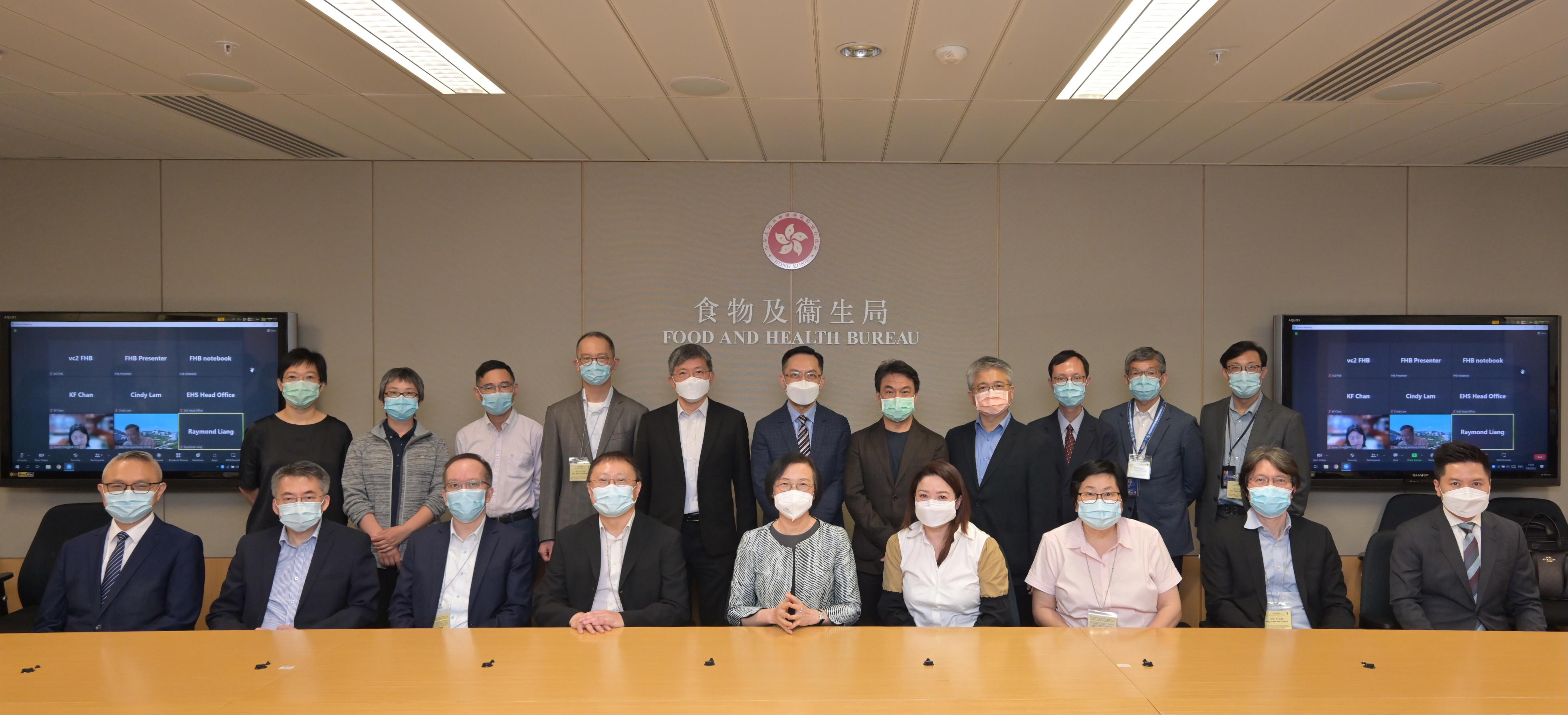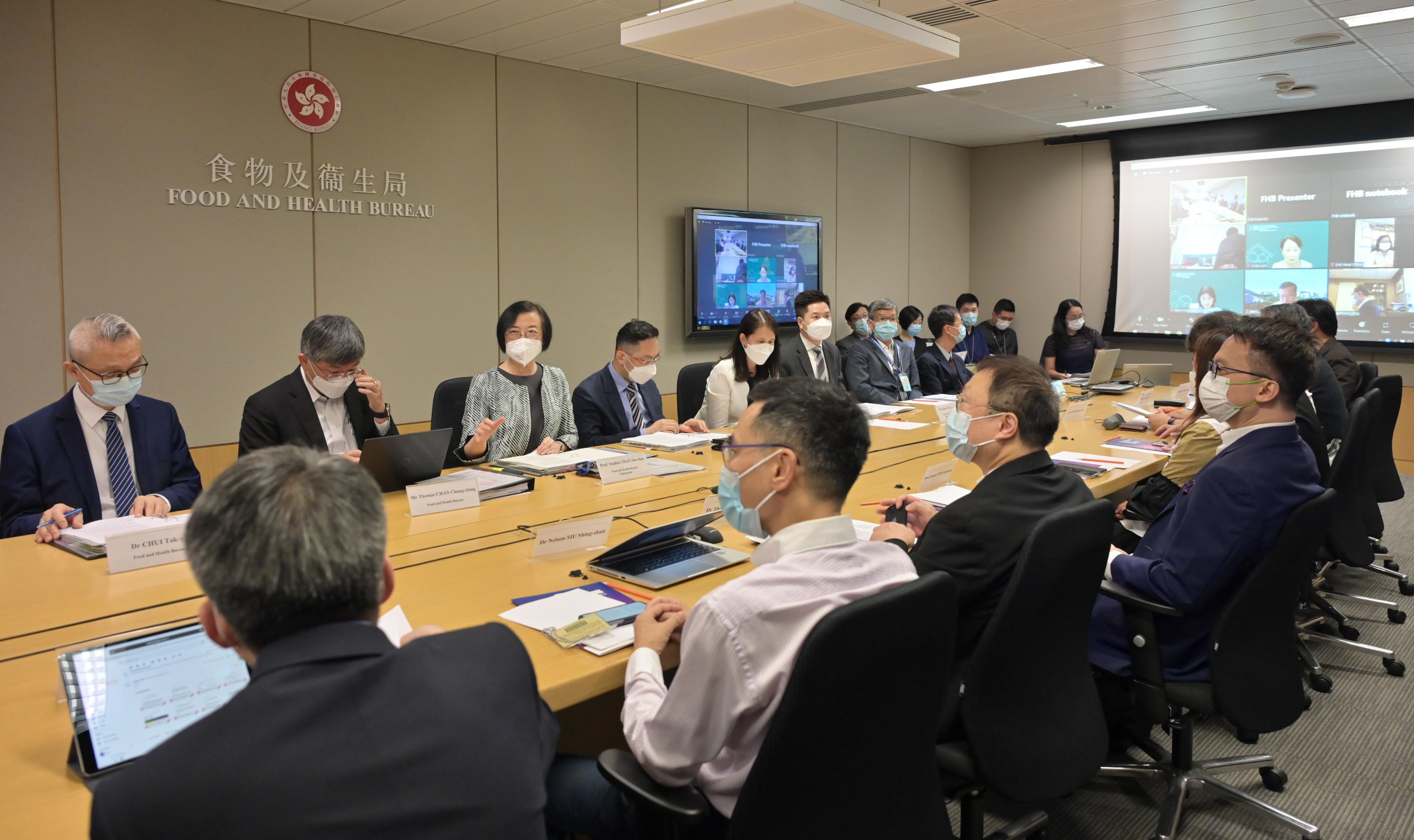SFH chairs seventeenth meeting of Cancer Coordinating Committee (with photos)
*****************************************************************************
The Secretary for Food and Health, Professor Sophia Chan, said, "Cancer is a global public health issue, and also the top killer in Hong Kong. Over the past five years, cancer claimed 40 lives every day on average. In view of the ageing and growing population, we believe that new cancer cases and related medical burden will continue to increase. In July 2019, the Government promulgated the first Cancer Strategy in Hong Kong, which formulates cancer prevention and control strategies for the period between 2020 and 2025 with regard to surveillance, prevention and screening, timely diagnosis and treatment, survivorship care and enhanced scientific research. With the concerted efforts of the DH, the HA, the PHO and relevant organisations in implementing the work under the Cancer Strategy over the past three years, we are gradually achieving the expected outcomes in various aspects, with a view to improving the quality of life and survivorship of cancer patients and reducing the burden of cancer on the local population."
At the meeting, members discussed the progress of various cancer prevention and control measures, including -
Surveillance
--------------
The Hong Kong Cancer Registry (HKCaR) strives to enhance the collection and compilation of stage data of prevalent cancers, and publish reports in phases on the stage-specific survival rates for these cancers on the basis of the local population as indexes for cancer surveillance.The published reports on six prevalent cancers included those issued in 2020 on breast and colorectal cancers, and those issued last year on gynecological and nasopharyngeal cancers.
Cancer Prevention and Screening
-------------------------------------
The DH has all along been promoting a healthy lifestyle as the primary strategy for cancer prevention. In recent years, the DH has strengthened public education related to female cancers in order to raise public awareness of cancer prevention and screening, including rolling out short videos promoting cervical screening in 2020, and producing two Announcements in the Public Interest last year to promote the awareness of breast health and breast cancer prevention. Moreover, the DH has also produced health information on the prevention and screening of cervical and breast cancers in at least six languages (including Hindi, Nepali, Urdu, Thai, Bahasa Indonesia and Tagalog) for ethnic minorities.
Besides, the DH has been subsidising asymptomatic Hong Kong residents aged between 50 and 75 to undergo colorectal cancer screening tests since January 2020, and providing breast cancer screening services through a pilot programme for eligible women aged between 44 and 69 in phases since September 2021 according to the recommendations of the Cancer Expert Working Group on Cancer Prevention and Screening (CEWG) of the CCC.
Starting from the 2019/20 school year, the DH has been providing the human papillomavirus (also known as HPV) vaccination services at schools to Primary 5 and 6 female students under the Hong Kong Childhood Immunisation Programme as a public health strategy to prevent cervical cancer. As at end of December last year, the vaccination rates of the first dose and the second dose of Primary 5 and 6 female students are 88 per cent and 86 per cent respectively in 2020/21 school year.
Diagnosis and Treatment
----------------------------
To achieve early detection and diagnosis of lung cancer, the HA has started to provide one-stop multi-disciplinary diagnostic services for suspected lung cancer patients on a trial basis since last year. Regarding treatment, the HA has increased day beds and manpower in different clusters to enhance chemotherapy services, and extended the service hours of radiotherapy services in five Oncology Centres from 2019/20.
The HA has also introduced advanced technology and treatment, including the installation of the first Magnetic Resonance (MR)-Simulator at Tuen Mun Hospital last year to provide a more modernised radiation treatment planning and method, and the introduction of Chimeric Antigen Receptor T-cell (CAR-T cell) treatment providing service on a trial basis in Queen Mary Hospital and Hong Kong Children's Hospital.
Survivorship Care
--------------------
The HA has developed a service framework for cancer survivors, with an aim to plan and develop the service and support required by cancer survivors and assist them to lead a healthy life in the community. This framework also delineates the service role and scope of different healthcare personnel, so that cancer patients will continue to receive integrated and personalised care after treatment.
Under this service framework, the HA is proactively developing disease-specific care programmes based on individual cancers, and different stakeholders are currently exploring and identifying service elements, including specialist outpatient nurse clinics providing nursing service to breast cancer survivors. This service will be launched on a trial basis in the New Territories East Cluster in 2022/23. In addition, the Kowloon West Cluster has collaborated with the Sham Shui Po District Health Centre since end of last year to provide assistance and mutual support group services to breast cancer survivors living or working in the district on a trial basis;
Research
----------
Since its establishment in 2011, the Health and Medical Research Fund (HMRF) has conducted nine open calls for investigator-initiated project applications and subsidised 385 cancer-related projects, which are worth $398 million in total. The main types of cancers addressed by these projects include liver, head and neck, colorectum/gastrointestinal tract, breast, leukaemia/lymphoma, gynaecological cancers and lung. From 2016 to 2020, the HMRF has supported 21 health promotion projects related to cancer and their risk factors (including smoking cessation, reduction of alcohol use, enhancing awareness of unhealthy diet, and enhancing physical activity), amounting to $19 million.
The HMRF has also commissioned two Phase 1 Clinical Trials Centres to conduct researches with a total funding of $180 million for 10 years. These two centres are responsible for providing infrastructure to support clinical trials in the early phase and launch tests on the safety, pharmacology and efficacy of various treatments for a range of cancers. Other major commissioned studies related to cancers include evaluation of the Government's colorectal cancer screening pilot programme; assessment of the risks of breast cancer in Hong Kong; the cost-benefit analysis of launching a population-based human papillomavirus vaccination programme; evaluation of Hong Kong's tobacco control policies in tackling tobacco‐related harms as a major risk factor for cancers; treatment options and outcomes for hepatitis B- and hepatitis C-related hepatocellular carcinoma, and use of genomics to tackle childhood cancers. Many of these studies have supported evidence-based policy formulation, such as the Government's introduction of the Breast Cancer Screening Pilot Programme in September 2021 through a risk-based approach in light of the findings of the commissioned study.
Members also reviewed the population-based cancer data for 2019, as well as the trends of incidence and mortality, and projections of major cancers in Hong Kong. In 2019, a total of 35 082 new cancer cases were diagnosed in Hong Kong, a rise of 3.1 per cent from that in 2018 by 1 054 cases, hitting a record high. Of these new cancers diagnosed, 17 685 were diagnosed in males, and 17 397 in females. Lung cancer has been slightly exceeding colorectal cancer to become the most prevalent cancer in Hong Kong again. Members noted that the current data reflected the burden and prevalence of cancer in Hong Kong, and considered that cohorts with cancers which exhibited an increasing incidence with significant mortality warrant special attention. The CCC also discussed and endorsed the screening recommendations of pancreatic and colorectal cancers by the CEWG.
"I would like to express my sincere gratitude to the members of the CCC for their time and efforts over the past years in formulating the first Cancer Strategy, reviewing the implementation progress and outcomes of relevant measures, as well as assessing the local trends of incidence and mortality of cancers. They provided valuable advice on further preventing and controlling cancers. In providing their advice, the CCC made reference to the recommendations of the World Health Organization and international practices, while taking the local actual situation into account. In particular, I am grateful to the CEWG and its Chairman, Dr Thomas Tsang, for providing professional and practical advice all along regarding screening of various cancers in Hong Kong. Over the past five years, the CEWG has revised the recommendations for breast, cervical, colorectal and liver cancers," Professor Chan said.
The CCC was established in 2001, comprising cancer experts and doctors from the public and private sectors, academics and public health professionals, to advise the formulation of strategies on cancer prevention and control and steer the direction of work in relation to cancer prevention and screening, treatment, surveillance and research. Under the CCC, the CEWG regularly reviews international and local evidence, and makes recommendations on cancer prevention and screening in the local context. In addition, the HKCaR, the HA and the Research Office of the FHB oversee cancer surveillance, treatment and research respectively.
Ends/Tuesday, June 7, 2022
Issued at HKT 23:19
Issued at HKT 23:19
NNNN






